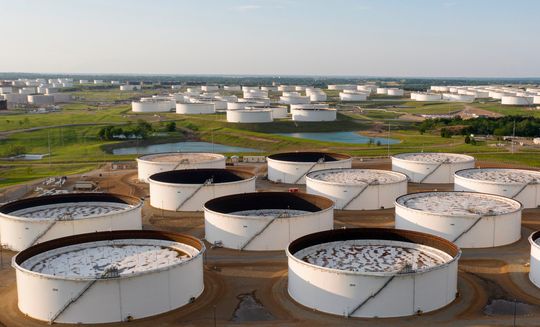Oil futures posted their highest finish in two weeks on Wednesday, buoyed by a weekly decline U.S. crude inventories and ongoing strength in implied demand for gasoline.
However, concerns that renewed restrictions tied to the spread of the coronavirus delta variant will lead to less fuel demand helped set a limit to oil’s price rise.
The Energy Information Administration reported on Wednesday that U.S. crude inventories fell by 4.1 million barrels for the week ended July 23. That marked the ninth weekly decline in 10 weeks.
“Despite refining activity ticking lower once again, a drop in production and lower imports have encouraged a crude draw,” said Matt Smith, director of commodity research at ClipperData. Total U.S. petroleum output fell by 200,000 barrels to 11.2 million barrels per day last week, according to the EIA.
The fall in crude supplies was larger than most market expectations. On average, analysts polled by S&P Global Platts forecast a decline of 2.5 million barrels for crude supplies. The American Petroleum Institute on Tuesday reported a 4.7 million-barrel decrease.
The EIA report “confirmed the tight physical market everyone was expecting,” said Manish Raj, chief financial officer at Velandera Energy.
The data show overall U.S. petroleum demand in July 2021 is well above the year-ago level, he said. The next several months are likely to “remain tight in crude supplies,” despite growing OPEC+ production.
West Texas Intermediate crude for September delivery CL00, 0.64% CLU21, 0.64% rose 74 cents, or 1%, to settle at $72.39 a barrel on the New York Mercantile Exchange. That was the highest front-month contract finish since July 14, according to Dow Jones Market data.
The front-month September Brent crude BRNU21, 0.60%, the global benchmark, added 26 cents, or nearly 0.4%, at $74.74 a barrel on ICE Futures Europe, also the highest since July 14. October Brent BRN00, 0.56% BRNV21, 0.58%, the most actively traded contract, rose 35 cents, or 0.5%, to $73.87 a barrel.
The EIA also reported weekly supply declines of 2.3 million barrels for gasoline and 3.1 million barrels for distillates. The S&P Global Platts survey forecast supply decreases of 1.3 million barrels for gasoline and 1.6 million barrels for distillates. The EIA data also showed crude stocks at the Cushing, Okla., storage hub edged down by 1.3 million barrels for the week.
“The larger than anticipated draw on inventories of both crude and refined products gave us some support and will help keep WTI above $70, despite concerns over renewed COVID-19 economic impacts and lagging global demands,” Gary Cunningham, director of research at Tradition Energy, told MarketWatch.
Even so, “with the anticipated growth in U.S. oil output later in the year, these levels will be tested if the delta variant outbreaks continue to manifest and travel restrictions return,” he said.
On Nymex, August gasoline RBQ21, 0.32% fell nearly 0.3% to $2.31 a gallon, while August heating oil HOQ21, 0.46% added 0.6% to $2.16 a gallon.
Implied demand for gasoline edged up for the week, according to the EIA. Total finished motor gasoline supplied, a proxy for demand, was at 9.325 million barrels per day last week, up slightly from 9.295 million bpd, and holding near the record of more than 10 million bpd seen during the week ended July 2.
The drawdown in gasoline supplies, as well as implied demand near a record, should “outweigh the coronavirus masking mandate,” said Phil Flynn, senior market analyst at The Price Futures Group.
Federal health officials on Tuesday recommended that Americans in counties with substantial or high rates of COVID-19 should begin wearing masks in public indoor spaces.
“Americans are more used to wearing masks and I don’t think it will keep them in the house because if they’re vaccinated, they will go out and drive,” said Flynn, shaking off concerns that the renewed COVID-related restrictions would hurt fuel demand.
Also on Nymex, August natural gas NGQ21, +0.73%, which expired at the end of the session, tacked on 1.8% to $4.04 per million British thermal units. The new front month September contract NGU21, -0.43% settled at $3.97 per million Btus, up 0.6%.

